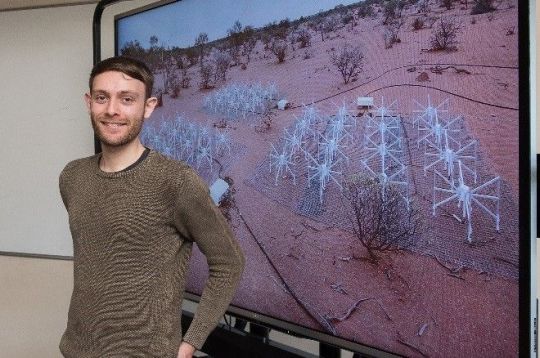Victoria University graduate to study with world’s best

A Victoria University of Wellington graduate has been awarded over a quarter of a million dollars in scholarships to undertake a PhD at one of the best universities in the world.
Luke Pratley, who gained a Master’s of Physics with distinction from Victoria last year, will begin his PhD at University College London (UCL) in September helping develop new imaging technology for next generation radio telescopes.
News of his third scholarship came last week when Universities New Zealand awarded Luke the prestigious William Georgetti Scholarship. When combined with two University College London scholarships, Luke will receive $270,000 to cover his international fees, travel and provide a living stipend for the three years of his study.
The 24-year-old is yet to pay off his current student loan, and is "extremely grateful" for all three scholarships that will help him attend UCL, which currently shares fifth spot in the QS World University rankings.
Luke will be part of a team of PhD students and postdoctoral researchers at UCL, establishing cutting-edge imaging techniques that create images showing events "millions to billions of light years away". "The images will improve our ability to map wide areas of the sky and will show things like merging galaxy clusters, radio jets powered by black holes, and the epoch when stars first formed in the universe," he says.
Luke is excited that his work will contribute to the world-leading, international Square Kilometre Array project (SKA), which aims to build the world’s largest radio telescope by 2030. Luke will start his PhD research using images from one of the SKA precursor telescopes, the Murchison Widefield Array, for which Victoria is a partner institution.
Victoria’s School of Chemical and Physical Sciences’ Associate Professor Melanie Johnston-Hollitt is delighted that her former student and current research assistant has won such sought-after scholarships.
"They’re not only giving him the chance to go to one of the finest universities in the world, but they’re allowing a connection between Victoria and University College London.
"Luke’s been working on radio imaging as a research assistant at Victoria over the last six years, and now he’ll get to put that experience into practice using our telescope data to test new imaging techniques. It’s a great opportunity for both universities to form a new collaboration and for Luke to keep his ties with New Zealand research," she says.
